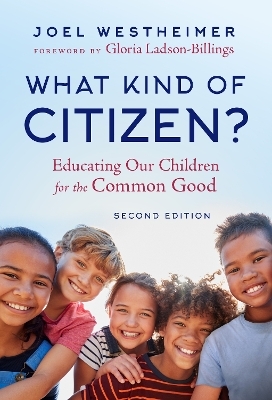
What Kind of Citizen?
Teachers' College Press (Verlag)
978-0-8077-6972-0 (ISBN)
- Titel z.Zt. nicht lieferbar
- Versandkostenfrei
- Auch auf Rechnung
- Artikel merken
Book Features:
A comprehensive look at why schools should be at the forefront of public engagement and how we can make that happen.
A framework that has been used in 67 countries to help teachers and school reformers structure educational programs that strengthen democratic societies.
Research-based guidance for aligning school goals with what parents, children, and teachers actually care about.
Accessible and engaging discussions gleaned through consultations with thousands of school teachers and civic leaders.
Empirical research from one of the most influential frameworks for citizenship and democratic education, “Three Kinds of Citizens,” which emerged from a collaboration between the author and Dr. Joseph Kahne.
Joel Westheimer is professor of the social foundations of education, former university research chair in democracy and education at the University of Ottawa, and the education columnist for CBC Radio’s Ottawa Morning show. He is the editor of Pledging Allegiance: The Politics of Patriotism in America's Schools.
Contents (final)
Foreword Gloria Ladson-Billings xi
Preface xv
Introduction 1
1. Changing the Narrative of School 5
The Script in Place 5
What Archeem Taught Me About Teaching 7
2. No Child Left Thinking 11
Teaching Questioning—Essential for Schools in Democratic Societies 12
The Attack on Critical Thinking 14
Not Just Race, Any Contested Material 16
3. No Teacher Left Teaching 21
Standardization: A Solution in Search of a Problem 22
Teacher Education in the Age of Standards and Accountability 26
De-Professionalization and the New Hypocrisy 27
4. How Did This Happen? 31
What Gets Tested Gets Taught 32
The Test Scores That Ate Humanity 34
Reclaiming the Profession: Teacher Professionalism and Democratic Thinking 36
5. What Kind of Citizen? 40
Three Kinds of Citizens 42
An Interlude for Reflection 46
The Many Faces of “Good” Citizenship 47
6. Personally Responsible Citizens 50
Why Personal Responsibility Is Not Enough 50
Are Evaluations Asking the Wrong Questions? 53
7. Participatory and Social Justice–Oriented Citizens 57
Participatory Citizens: The Madison County Youth Service League 59
Justice-Oriented Citizens: Bayside Students for Justice 64
The Importance of Recognizing Different Conceptions of Citizenship 71
The Influence of Community Context 74
Pursuing Dual Goals 75
8. Thinking, Engaged Citizens 76
Connecting Learning to Social and Civic Goals 77
Scaling Up: Regional and National Programs 86
Scaling Down: Thinking About a Thinking Curriculum 87
Engaging with the Community 91
9. Six Myths About Education 93
Myth 1. National Standards Ensure Quality Education 93
Myth 2. Dissent Should Be Medicated 94
Myth 3. The Only Way to Teach Democratic Thinking Is to Make the Entire School Democratic 96
Myth 4. When It Comes to Community-Based Experiences, Knowledge Must Always Precede Action (You Have to Know Stuff Before You Do Stuff) 99
Myth 5. Teachers Who Care About Whether Students Can Think for Themselves Don’t Care About Facts or Basic Skills 100
Myth 6. Community-Based Experiences Must Be Successful 101
10. What Kind of School? 105
Acknowledgments 113
Notes 117
Index 131
About the Author 139
| Erscheinungsdatum | 27.03.2024 |
|---|---|
| Vorwort | Gloria Ladson-Billings |
| Verlagsort | New York |
| Sprache | englisch |
| Maße | 156 x 229 mm |
| Gewicht | 227 g |
| Themenwelt | Sozialwissenschaften ► Pädagogik ► Allgemeines / Lexika |
| Sozialwissenschaften ► Pädagogik ► Bildungstheorie | |
| Sozialwissenschaften ► Politik / Verwaltung ► Politische Theorie | |
| ISBN-10 | 0-8077-6972-X / 080776972X |
| ISBN-13 | 978-0-8077-6972-0 / 9780807769720 |
| Zustand | Neuware |
| Haben Sie eine Frage zum Produkt? |
aus dem Bereich


